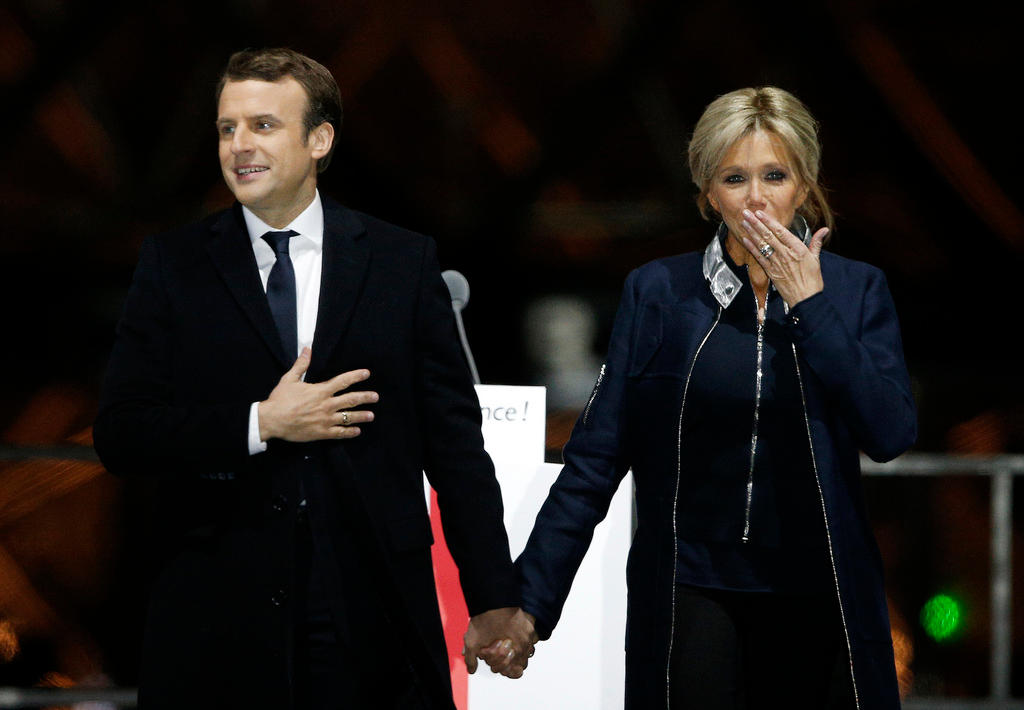Hard work begins for Macron after historic French election

Swiss news media reacted with relief and hope at French centrist Emmanuel Macron’s decisive and larger-than-expected victory in Sunday’s presidential election, by a margin of 66% to 34%, over far-right and anti-European Union candidate Marine Le Pen.
The election of 39-year-old Macron, an ex-banker who is France’s new president-elect and the youngest ever to win the presidency, was seen as yet another sign that Brexit and the rise of US President Trump had not ushered in a new wave of unchecked anti-immigrant nationalism. Le Pen and her party’s legacy of far-right Holocaust revisionism fell short, as did the far-right, anti-globalist candidates in Austria and the Netherlands.
“France has chosen a new man to modernize France… taking over an old country so far unable to fit into the complexity of the time”, said the Geneva-based Le Temps. “It is a master stroke on the part of the newly elected and also a sign of great maturity of the electorate.”
The newspaper, however, cautioned that even with French voters delivering yet another mainstream candidate to office in the face of a seeming anti-immigrant populist wave, “nothing will be easy” in the aftermath of the French election if Macron cannot summon the necessary charisma and skills to bridge the nation’s stark divisions.
Hope and risk
The Tribune de Genève heralded France’s “new era” as good news, a win for rationality and common sense, after the shocks of Brexit and Donald Trump’s victory. Though Macron “constitutes a risk”, the newspaper said his intellect, pragmatism and spirit of renewal are “certainly the best bet” for France. The Journal du Jura, meanwhile, called the election “a severe disavowal” of Le Pen and her party, the National Front, which has thwarted the far-right’s momentum and her existential threat to the EU.
However, French-language Swiss newspapers such as Le Courrier and La Liberté noted the unusually low turnout and record number of blank ballots among French voters disaffected by the polarised vote – globalist versus nationalist. La Liberté said the “historical number of blank and null ballots makes it a default presidency” for Macron and his En Marche! Movement.
Among German-language Swiss newspapers, the Neue Zürcher Zeitung (NZZ) said it was delighted that “reason has triumphed in the country of Descartes”, though it considered Macron a “weak president, for personal and institutional reasons” that include voters’ rejection of Le Pen but not necessarily support for Macron’s platform.
Blick newspaper said the worst possible outcome had been avoided, and several Swiss regional newspapers agreed.
“The third populist coup following the Brexit and the election of Donald Trump did not happen,” said Berner Zeitung, Argauer Zeitung and Luzerner Zeitung. “It is unimaginable to think about what would have happened if Marine Le Pen had reached the Élysée (Présidence de la République): in Paris, and in Brussels, nothing would have remained standing.”
Swiss Foreign Minister
The morning after the election, Swiss Foreign Minister Didier Burkhalter told Swiss public broadcaster RTS that Switzerland congratulates President-elect Emmanuel Macron on his election victory.
“Yes, France has a new face, I think it can be said,” Burkhalter said. “The result is clear and the state of mind is also interesting: it is the debate over values that personally interested me a lot in recent days.”
Burkhalter praised the young president-elect as a force for youthful energy, optimism, constructive and humanistic change in a country with many problems that need fixing. “If the country gains confidence, it can begin to really tackle the problems,” he said.
Whether Macron’s election bodes well for Switzerland, Burkhalter said he could not yet say, however, in two aspects Bern and Paris share similar priorities.
“Bilateral relations have become even stronger in recent years, very intense, rather positive,” said Burkhalter. “We want to continue and intensify the good relations we have with our neighbors and especially cross-border relations and economic and social elements.”
The second aspect is European cohesion. “The signal that is given by France today is that (…) for stability and peace in this continent, we must work together. And our contribution is a bilateral path that allows stability with the European Union. I think we can work with President Macron on this. “

In compliance with the JTI standards
More: SWI swissinfo.ch certified by the Journalism Trust Initiative
You can find an overview of ongoing debates with our journalists here. Please join us!
If you want to start a conversation about a topic raised in this article or want to report factual errors, email us at english@swissinfo.ch.